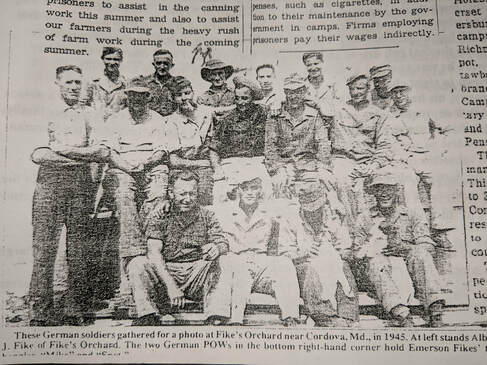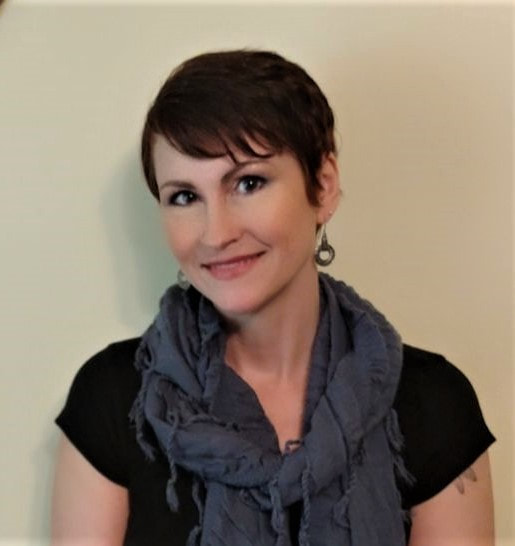On Monday morning, early, my husband drove our farm truck to the old Easton airport to collect the prisoners. He was allowed 20 POWs. Each prisoner brought a small brown bag with them for lunch, the camp sent a couple of men as guards. We soon discovered none of the prisoners had ever picked apples. It was the first apple orchard they had ever seen. Only a few of the POWs could speak good English, most of the group were very young boys, the older men had been lawyers or business men in Germany. The prisoners seemed willing to work, they were smart and learned quickly.
After a couple of days the guards no longer came with the prisoners, we were satisfied with their working ability, but my husband did not think the prisoners were receiving enough food. Their brown bag held two pieces of bread and a thin slice of lunch meat. The prison camp rules were you could not feed the POWs. The Fike family had a discussion on this rule and decided for both parties involved, they would supply a little extra food at lunch time.
Each day a large pot was on the stove with soup, stews, or any local cooked vegetables, along with a milk can of ice tea. For a dessert, the group seemed to like best a square of gingerbread. The extra food made the workers happy. They easily handled all kinds of chores at our apple orchard and we were able to supply the local area with apples.
One of the youngest prisoners became a friend with my husband's brother, who was 18. The prisoner was 16 years old, his name was Franz Krautcreamer. He was intelligent and learned to speak English quickly. The first time he came in our house, tears came in his eyes when he saw our piano. His family had a piano before the war. We asked Franz to sit down and play our piano, within minutes we knew he was good at playing the piano.
In November of 1945 the German prisoners were pulled out of this country and returned to their homeland. Our family was sorry to see them leave because they had become more than just workers. They had become our family friends, most had picked up enough English to make good conversation.
In the months after the POWs had left this country, we continued to receive mail from many of the group who had worked at our orchard. The oldest person in the group was in his forties, wrote to tell of his marriage. The net year when he wrote, his wife had a baby boy and he named him "Norman" because of the kindness our family in war time had shown him.
My greatest surprise of the prisoners came many years later, as we had kept in contact with our 16 year old Franz. He had went to college, then married and had a large family and became a wealthy business man, due to a navigation invention he had made.
It was an afternoon in 1970 when a Washington taxi stopped at our back door and a man carrying an armful of flowers knocked on our back door. I opened the door and recognized Franz Krautcreamer. We hugged and both did cry. He had planned this stop because we were the American friends who had smiled and showed kindness to a scared 16 year old boy imprisoned in a foreign country in war time, this he never forgot.
We all had dinner, including the taxi cab driver, and talked for hours. Franz then had to leave to catch the plane to Florida, where he was opening a business office. He made us promise to visit him in Germany. His family had grown to eight children.
We did visit Franz in Germany. His home was a 16-room restored castle on the Rhine River! We got a deluxe tour of Germany and it was a such an enjoyable trip, we later made a second trip to visit the Krautcreamer family. All because of giving a helping hand to a stranger in war time, our family made good friends with a German family twenty years later.
--Annice Ebling Fike


 RSS Feed
RSS Feed